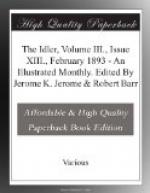[Illustration: “A LITTLE CHEQUE.” (MR. IRVING AS “DIGBY GRANT” IN “TWO ROSES.")]
Judged by this test, I have no hesitation in regarding Mr. Irving’s King Lear as the finest creation of his genius. This is an instance in which the actor creates the piece. Shakespeare is, as a poet and playwright, at his worst in “King Lear.” Yet his accessories are wonderful in variety and suggestiveness. Only Shakespeare could have created the heath, and have so ordered the old King’s passion, as to make his madness part of the very thunder and lightning. That was Shakespeare’s magnificent conception, and Mr. Irving’s rendering is worthy of its tempestuous grandeur. How to talk up to the storm, how to pierce the tumult with the cries of human distress, how to escape the ridiculous and the incongruous, how to be a King on the desolate heath, and to make the royalty gleam through the angry darkness, were the problems, and Mr. Irving solved them one and all, even with redundance of faculty and skill. At the end of the heath scene the man is more remembered than the storm. It has been objected that in the first scene Mr. Irving’s Lear is too old and feeble. I venture to think otherwise. I further venture to think that the King’s age and the King’s imbecility have both been accurately appreciated. A man at eighty, a man athirst for flattery, a man who would pay a kingdom in exchange for adulation, must have outlived all that is best and strongest in human nature. He comes upon the stage as a wreck. His vanity has eaten up his sagacity, so that she, Goneril or Regan, who can flatter most, can lie most, and can play the devil best, shall fare most lavishly at his hands. Is it not well partly to excuse these excesses of self-valuation by such mitigations as can be found in the infirmity of old age? Even in an elderly man they would have been treated with contempt; they could only be endured in one whose eighty years had been doubled by the hardness of his life lot.




